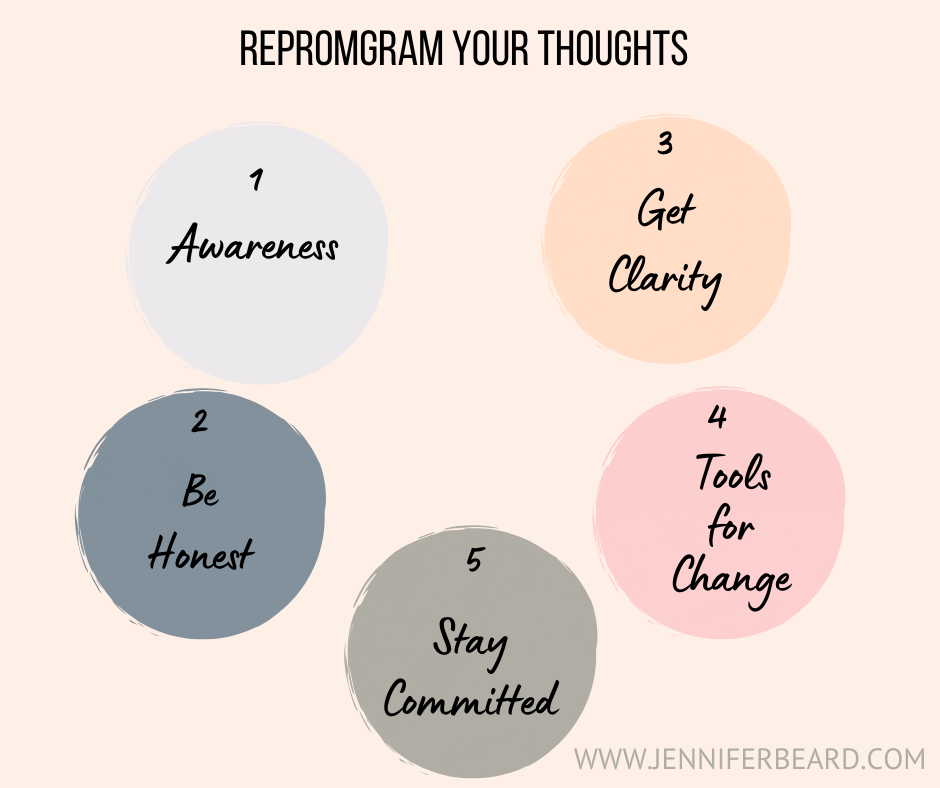Get the Guide
A simple, encouraging guide to help parents confidently transition into homeschooling, build a customized learning rhythm, and create a thriving educational experience at home.
Homeschooling 101 Starter Guide
Family
FAVE LINKS
Topics
Hi, I’m Jennifer — transformation coach, homeschooling mentor, and guide for parents ready to create a life that truly fits. I help you break through fear, align with your values, and confidently design both your child’s education and your own bold, authentic life.

Imagine your brain as an ultra-sophisticated computer, running various programs that dictate your thoughts, actions, and reactions.
Interestingly, about 95% of these programs aren’t ones you consciously chose; they were installed during your early years.
This newsletter dives into understanding this programming and lays out a practical guide to rewire your brain for a more fulfilling life.
The Early Years: A Time of Subconscious Programming
From birth until about the age of seven, your brain operates primarily in an alpha wave state.
This phase is akin to hypnosis – a period of hyperlearning where your environment significantly influences your developing mind.
Your parents, friends, the media, and educational institutions play a pivotal role in shaping your beliefs, behaviors, and overall worldview.
This ‘download’ of information and norms sets the stage for how you perceive and interact with the world.
Imagine this scene: a father, just back from a particularly rough day at work. There was a major issue, and he was unfairly blamed for it.
As he walks through the door, his mind is a whirlwind of worry, wondering if he’ll still have his job tomorrow.
In his distracted state, he stumbles over some toys scattered near the doorway. His four-year-old son is playing nearby, oblivious to his father’s mounting stress.
Overwhelmed and frustrated, the dad snaps in a harsh tone, “How many times do I have to tell you to keep the doorway clear? What do I have to do to make you stop doing this? You never learn!”
In that moment, the little boy internalizes his father’s words in a way that’s far more significant than the dad realizes.
To the child, his father’s outburst isn’t just about toys in the doorway; it’s a message about his own abilities.
He starts to believe that he’s incapable of learning or making positive changes without harsh lessons.
The idea takes root that mistakes lead to disappointment and anger.
What the boy doesn’t understand is that his dad’s reaction isn’t really about him or the toys.
It’s the result of external pressures and a bad day at work. But in the world of a four-year-old, these nuances are lost.
For the dad, this incident is minor, just a fleeting moment of frustration quickly forgotten.
But for the young boy, it’s a small yet impactful experience that shapes his perception of learning, change, and even his own self-worth.
The Impact of Pre-Installed Beliefs
As you grow older, these early-installed beliefs and patterns continue to influence your life, often subconsciously.
They can manifest in various ways – from the career paths you pursue to the relationships you form and maintain.
The challenge is that many of these ingrained beliefs may not align with your aspirations or true self, leading to a disconnect between what you desire and what you achieve.
Have you ever noticed how in some families or social circles, there’s a pretty narrow view of what success looks like?
It’s like there’s this unwritten rule that the only way to be ‘successful’ is to land a job as a lawyer, doctor, or some other high-status profession.
In these environments, family members or friends who follow these paths are often put on a pedestal, showered with praise and admiration.
On the flip side, if someone decides to tread a different path – say, becoming an artist, entrepreneur, or anything outside that traditional ‘success’ box – they often face a barrage of questions or even outright criticism.
It’s as if choosing a less conventional career is somehow less worthy or respectable.
This phenomenon isn’t just limited to families.
You can spot it in various communities, religious groups, workplaces, and even among friends.
It’s like there’s a societal script for success, and anyone who deviates from it is seen as taking a risk or, worse, failing to live up to their potential.
It’s fascinating, and a bit disheartening, how these perceptions shape our choices and the pressure we feel to conform to certain standards of success.
But it’s also a reminder of the diverse paths to fulfillment and achievement, and how important it is to champion and respect individual choices and journeys.
We have the ability to change our brains to live up to our personal best, creating the individual expression of our inner wisdom.
In this, we can far exceed the level of “success” we would have attained following the safe, acceptable route.
Neuroplasticity: The Game Changer
The good news is that the brain is not a static organ; it’s dynamic and changeable, thanks to neuroplasticity.
This remarkable feature of the brain allows for the reorganization and formation of new neural connections throughout life.
It means you can ‘reprogram’ your brain, much like updating software on a computer.

A Roadmap to Reprogramming Your Brain
1. Awareness Is the First Step: Begin by observing your thoughts, behaviors, and habits. Identify patterns that may stem from your early programming. This awareness is crucial for change.
2. Honest Self-Assessment: Confront your current reality with honesty. Acknowledge where you are in life and how your ingrained beliefs have shaped your journey.
3. Envisioning Change: Clearly define how you want your life to change. What beliefs would support the life you aspire to live? Visualization can be a powerful tool in this phase.
4. Techniques for Change: There are various methods to rewire your brain, including affirmations, EFT, hypnosis, and PSYCH-K®️(this is my go-to tool for changing beliefs quickly and easily). These techniques vary in approach but share a common goal – to replace limiting beliefs with empowering ones.
5. Commitment and Consistency: Reprogramming your brain is not a one-time event but a continuous process. Commit to the journey and be consistent in practicing the techniques you choose.
Making Dreams a Reality
By understanding the power of early programming and embracing the potential of neuroplasticity, you can embark on a transformative journey.
This process is not just about changing thoughts; it’s about changing your life.
With commitment, awareness, and the right tools, you can break free from outdated programming and pave the way for a future that resonates with your truest self.
Your brain is the most powerful tool you have – learn to use it effectively, and there’s no limit to what you can achieve.
Go make the changes today!
Take Care,
Jen
p.s. To download our FREE E-Books Master Your Mind or The Gratitude Plan at this page here. And while you are at it stay ahead of the game and join our community! Sign up for our weekly newsletter to get exclusive insights, tips, and strategies right in your inbox. Don’t miss out on the chance to elevate your journey every week.
Disclaimer: Please note that this article is intended to provide general information and inspiration. While it offers valuable insights, it’s essential to remember that it’s not a substitute for professional advice or therapy.
Productivity
Homeschooling
authenticity
intuition
BeLIEF CHANGE
Browse the categories
JenniferBeard.com 2025. All Rights Reserved.
17195 Silver Lake Parkway #136 Fenton, MI 48430 | PRIVACY | TERMS
Hi, I’m Jennifer — transformation coach, homeschooling mentor, and guide for those who are ready to create a life that truly fits. I help you break through fear, align with your values, and confidently design both your child’s education and your own bold, authentic life.
HAPPINESS STARTS
WITH YOU!
Get this practical guide for living a life of joy now!
Start homeschooling confidently
Get the homeschool guide
Check out our private coaching




Comments Off on How to Reprogram Your Thoughts for a Better Life